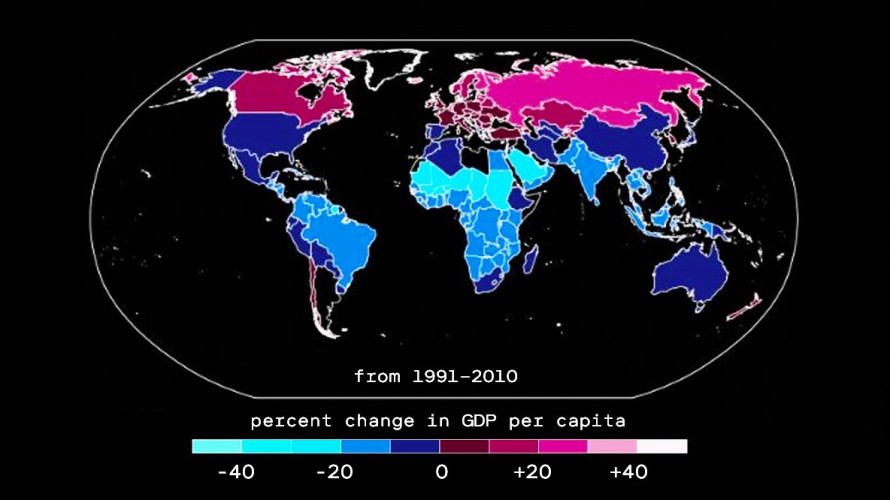Climate change has already made poor countries poorer and rich countries richer
But few nations will be spared as temperatures rise further.
by James Temple
Apr 22
Numerous studies have predicted that poor nations will suffer the greatest devastation from climate change. (See “Hotter days will drive global inequality.”) A new analysis finds it’s already been happening for decades.
From 1961 to 2010, rising temperatures cut the per-person gross domestic product of the world’s poorest countries by 17% to 31%, according to a study published today in the Proceedings of the National Academy of Sciences. That, in turn, widened the gap in economic output between poor and rich nations by 25% more than it would have been “in a world without global warming,” slowing an otherwise positive shift toward shrinking inequality over that half-century.
All of that has happened with only around a 1 °C rise in global temperatures, but far worse changes are in store. The planet could warm by 1.5 °C as early as 2030, and by more than 4 °C by the end of the century, according to the United Nations climate panel.
The inequity is exacerbated by the fact that the nations suffering the worst economic effects have pumped out the least carbon dioxide. Among the 19 wealthier nations where historical emissions divided by the current population exceeds 300 tons, 14 have benefited economically so far. Those countries experienced a median of 13% more economic output per person, the Stanford researchers found in the study.
The researchers conducted the study by comparing economic growth rates during the time period in question with a range of modeling results simulating a world that didn’t get hotter in recent decades, says Noah Diffenbaugh, a climate scientist at Stanford, who coauthored the paper with Marshall Burke.
Poorer nations have suffered harsher effects in part because they’re concentrated in already hotter parts of the world, like Africa, South Asia, and Central America. In such places, a tick up in temperatures can quickly cut labor productivity and agricultural yields while increasing levels of violence, crime, suicides, illness, and mortality. These effects have been identified in many studies, including earlier work by Burke (see “Hot and violent”). In addition, the same countries often don’t have the money to invest in tools, infrastructure, and programs to address these dangers.
Country level economic impact of global warming

PROCEEDINGS OF THE NATIONAL ACADEMY OF SCIENCES
On the other hand, a little bit of warming can nudge cooler or temperate countries toward the “empirical optimum,” where productivity and agriculture yields actually rise. Warming in Norway, for instance, likely boosted per capita GDP by 34% over what the Scandinavian nation would have experienced in a world without global warming, while India experienced 31% less growth than it would have.
None of this means that richer nations are in the clear, of course. Various parts of the US are already grappling with more frequent or severe extreme weather events that have been strongly linked to climate change, including hurricanes, droughts, and wildfires. Plenty of other studies have concluded that warming will have devastating effects on the economies of most nations in the decades to come (though a few frosty ones, notably Canada and Russia, could wind up better off economically).
As the resolution of climate modeling improves, it’s becoming increasingly clear that the effects of climate change will vary dramatically within countries as well. A 2017 study led by Solomon Hsiang at the University of California, Berkeley, found that the hotter regions of the US South will suffer disproportionately under high emissions scenarios, resulting in a massive shift in wealth toward the North and West that would increase the nation’s economic inequality.
These highly variable economic consequences promise to significantly complicate the politics of how nations and regions work together to address the looming dangers—or how they don’t.
Global warming has increased global economic inequality
Noah S. Diffenbaugh and Marshall Burke
https://plawiuk.blogspot.com/2019/04/global-warming-has-increased-global.html
PNAS first published April 22, 2019
No comments:
Post a Comment